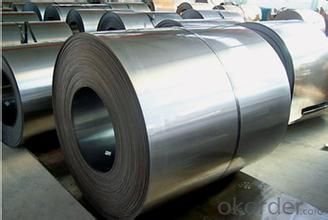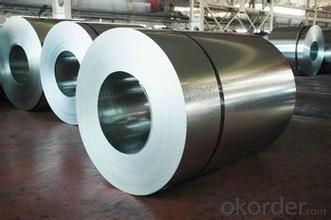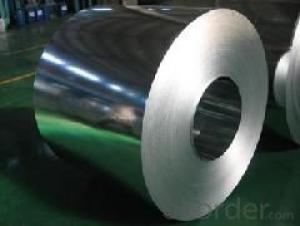Hot-Dip Galvanized Steel Coil with Competitive Price of China
- Loading Port:
- Tianjin
- Payment Terms:
- TT OR LC
- Min Order Qty:
- 50 m.t.
- Supply Capability:
- 10000 m.t./month
OKorder Service Pledge
OKorder Financial Service
You Might Also Like
1. Hot-Dip Galvanized Steel Coil Description:
Hot-dip galvanized steel coil are available with a pure zinc coating through the hot-dip galvanizing process. It offers the economy, strength and formability of steel combined with the corrosion resistance of zinc. The hot-dip process is the process by which steel gets coated in layers of zinc to protect against rust. It is especially useful for countless outdoor and industrial application.
2.Main Features of the Hot-Dip Galvanized Steel Coil:
• Excellent process capability
• Smooth and flat surface
• Workability, durability
• Excellent heat resistance performance
• High strength
• Good formability
• Good visual effect
3.Hot-Dip Galvanized Steel Coil Images


4.Hot-Dip Galvanized Steel Coil Specification
Standard: AISI, ASTM, BS, DIN, GB, JIS
Grade: SPCC, SPCD, Q195, DX51D
Thickness: 0.15-5.0mm
Model Number: coil
Type: Steel Coil
Technique: Cold Rolled
Surface Treatment: Galvanized
Application: Container Plate
Special Use: High-strength Steel Plate
Width: 600-1250mm
Length: depends
commodity: hot dipped galvanized steel coil
technique: cold rolled
thickness: 0.15-5.0mm
width: 600-1500mm
surface treatment: galvanized
zinc coating: 50-275g/m2
coil weight: 3-7 tons
coil ID: 508/610mm
spangle: zero spangle, regular spangle, small spangle, big spangle
payment term: by L/C or T/T
5.FAQ of Hot-Dip Galvanized Steel Coil
What’s the application of this product?
There are many applications for this product. For example, roofing, cladding, decking, tiles, sandwich walls, etc.
What’s the coating composition of Hot-Dip Galvanized Steel Coil?
The coating composition is 55% aluminium in weight ratio, 43.4% zinc, and 1.5% silicon, with excellent corrosion and heat resistance performance.
- Q:How are steel coils used in the manufacturing of automotive chassis?
- Steel coils are used in the manufacturing of automotive chassis as they are shaped and formed into various structural components such as frame rails, cross members, and support beams. These coils are cut, bent, and welded together to create a strong and rigid chassis structure, providing the necessary strength and stability for the vehicle.
- Q:What are the different types of coatings applied to steel coils?
- Steel coils can be coated with a variety of coatings, each serving a specific purpose and offering unique advantages. 1. Galvanized Coating: Among the most frequently used coatings for steel coils is the galvanized coating, which entails the application of a layer of zinc to the steel surface. Galvanized coatings offer exceptional corrosion resistance, making them ideal for outdoor applications where the steel may come into contact with moisture or harsh environmental conditions. 2. Galvalume Coating: Similar to galvanized coating, galvalume coating also involves the application of a zinc layer to the steel surface. However, it incorporates a small amount of aluminum as well. This addition enhances the coating's corrosion resistance and improves heat reflectivity. Galvalume coatings are commonly employed in roofing and cladding applications. 3. Pre-painted Coating: Pre-painted coatings encompass the application of a layer of paint or primer to the steel surface. This type of coating allows for customization in terms of color and finish. Pre-painted coatings not only enhance the steel's aesthetic appeal but also provide added protection against corrosion and weathering. 4. Organic Coating: Organic coatings are typically applied as a topcoat over galvanized or galvalume coatings. They are composed of various resins, such as polyester, epoxy, or polyurethane, which offer additional protection against corrosion, abrasion, and chemicals. Organic coatings are frequently utilized in industries that prioritize both durability and aesthetics, such as the automotive sector. 5. Metallic Coating: Metallic coatings, such as aluminum or zinc, are applied to steel coils using the hot-dip coating process. These coatings deliver exceptional corrosion resistance and are commonly used in applications where the steel is exposed to high temperatures or corrosive environments. 6. Chromate Conversion Coating: Chromate conversion coatings are primarily applied to steel coils for their corrosion resistance properties. They are frequently employed in electrical applications to safeguard against galvanic corrosion and enhance conductivity. Ultimately, the choice of coating for steel coils is contingent upon specific application requirements, including the desired level of corrosion resistance, aesthetic considerations, and environmental factors.
- Q:What are the challenges faced in the recycling of steel coils?
- The recycling of steel coils presents several challenges that must be overcome. To start, the collection and sorting process poses a significant hurdle. Steel coils are often utilized in large-scale industries and construction projects, making it challenging to gather and transport them for recycling purposes. Moreover, steel coils can become mixed with other materials, such as plastic or wood, further complicating the sorting process. Another obstacle is the size and weight of steel coils. Given that steel is a heavy material, handling and processing large coils can be quite difficult. Specialized equipment and machinery may be necessary to efficiently move and separate the coils, thereby increasing the cost and complexity of the recycling process. Additionally, the recyclability of steel coils can be impacted by varying quality. These coils may contain impurities or contaminants, such as oil or paint, that must be eliminated before recycling. Such impurities can compromise the integrity and quality of the recycled steel, making it less desirable for certain applications. Moreover, the recycling of steel coils demands substantial energy and resources. Melting down the steel requires a significant amount of energy, while the transportation and processing of the coils also consume resources and contribute to carbon emissions. Consequently, the environmental friendliness of the recycling process can be diminished. Lastly, the viability of the recycling industry can be influenced by fluctuating market demand for recycled steel coils. The demand for steel products can vary depending on economic conditions and industry trends, making it challenging for recyclers to find buyers for their recycled coils. This can potentially result in stockpiling or disposal difficulties. In conclusion, while recycling steel coils offers environmental benefits and resource conservation, several challenges must be addressed for its successful implementation. These challenges encompass collection and sorting, handling and processing, quality control, energy and resource consumption, as well as market demand.
- Q:How are steel coils used in the manufacturing of steering columns?
- Steel coils are used in the manufacturing of steering columns as they provide the necessary strength and flexibility to withstand the forces and vibrations experienced during steering. The coils are shaped and formed into the desired design, allowing for the smooth and controlled movement of the steering column.
- Q:Im getting a new guitar soon, and it has steel strings. ive heard that nilon strings are better? thanks:)
- Nylon strings aren't better The very notion of such is absurd. They're different. They sound different and feel different. Different guitars are designed for different types of strings. Nylon string guitars are most commonly associated with classical music (you'll never see a real classical musician play a steel string guitar) Whoever told you that nylon strings are better should be ignored altogether. They're obviously not a good source of information.
- Q:Can steel coils be rewound?
- Yes, steel coils can be rewound.
- Q:No. Not Stainless steel, I mean STEEL.Not a specific type, but STEEL.Thanks. xo
- Is Steel A Pure Substance
- Q:What are the different grades of steel used for coils?
- The different grades of steel used for coils vary depending on the specific application and requirements. Some common grades include low carbon steel (C1008/1010), medium carbon steel (C1045), high carbon steel (C1070/1095), stainless steel (304/316), and advanced high-strength steels (AHSS) like dual-phase (DP), transformation-induced plasticity (TRIP), and martensitic (MS). Each grade offers different properties such as strength, corrosion resistance, formability, and weldability, allowing manufacturers to choose the most suitable grade for their coil production.
- Q:Can steel coils be used in the production of construction machinery?
- Indeed, the utilization of steel coils is applicable in the manufacturing process of construction machinery. Frequently, steel coils serve as the primary elements employed in the production of diverse components, including frames, chassis, gears, and structural parts for construction machinery. The exceptional strength and enduring nature of steel render it the perfect material for construction machinery, given its ability to withstand demanding operational conditions. Furthermore, steel coils offer effortless shaping, welding, and fabrication procedures to achieve the desired shapes and sizes, thereby providing customization and adaptability in the production of construction machinery.
- Q:What is the best butcher's steel around $20? I'm looking for a good tool to straight out some kitchen knives. thanks
- get one made in germany if you can. you might want to invest in some stones. they have some great videos on youtube on how to sharpen knives.
1. Manufacturer Overview |
|
|---|---|
| Location | |
| Year Established | |
| Annual Output Value | |
| Main Markets | |
| Company Certifications | |
2. Manufacturer Certificates |
|
|---|---|
| a) Certification Name | |
| Range | |
| Reference | |
| Validity Period | |
3. Manufacturer Capability |
|
|---|---|
| a)Trade Capacity | |
| Nearest Port | |
| Export Percentage | |
| No.of Employees in Trade Department | |
| Language Spoken: | |
| b)Factory Information | |
| Factory Size: | |
| No. of Production Lines | |
| Contract Manufacturing | |
| Product Price Range | |
Send your message to us
Hot-Dip Galvanized Steel Coil with Competitive Price of China
- Loading Port:
- Tianjin
- Payment Terms:
- TT OR LC
- Min Order Qty:
- 50 m.t.
- Supply Capability:
- 10000 m.t./month
OKorder Service Pledge
OKorder Financial Service
Similar products
New products
Hot products
Hot Searches
Related keywords





























